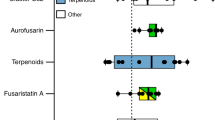Abstract
HITHERTO the usual technique for isolating tetrads from Agarics has been to detach a piece of gill tissue from a mature sporophore and then, with the aid of a micromanipulator, to pick off whole tetrads directly from the fresh gill. There are three main difficulties inherent in this method: (a) because of the high numerical density of tetrads on the gill, it is very difficult to be sure that no extraneous spores have been picked up by the micro-manipulator needle until the spores are parked on the germination medium; (b) it is impossible to distinguish unripe from ripe tetrads, and since the former are removed from their basidia with great difficulty, many abortive attempts to pick up tetrads are frequently made before a tetrad is successfully removed; (c) in the case of Coprinus, autolysis of the gill can greatly limit the time available for isolation.
This is a preview of subscription content, access via your institution
Access options
Subscribe to this journal
Receive 51 print issues and online access
$199.00 per year
only $3.90 per issue
Buy this article
- Purchase on Springer Link
- Instant access to full article PDF
Prices may be subject to local taxes which are calculated during checkout
Similar content being viewed by others
Author information
Authors and Affiliations
Rights and permissions
About this article
Cite this article
MOORE, D. New Method of Isolating the Tetrads of Agarics. Nature 209, 1157–1158 (1966). https://doi.org/10.1038/2091157b0
Issue Date:
DOI: https://doi.org/10.1038/2091157b0
This article is cited by
-
Unusual organization and lack of recombination in the ribosomal RNA genes of Coprinus cinereus
Current Genetics (1984)
-
Characterization of genes which influence allelic recombination in Coprinus cinereus
Current Genetics (1980)
Comments
By submitting a comment you agree to abide by our Terms and Community Guidelines. If you find something abusive or that does not comply with our terms or guidelines please flag it as inappropriate.



